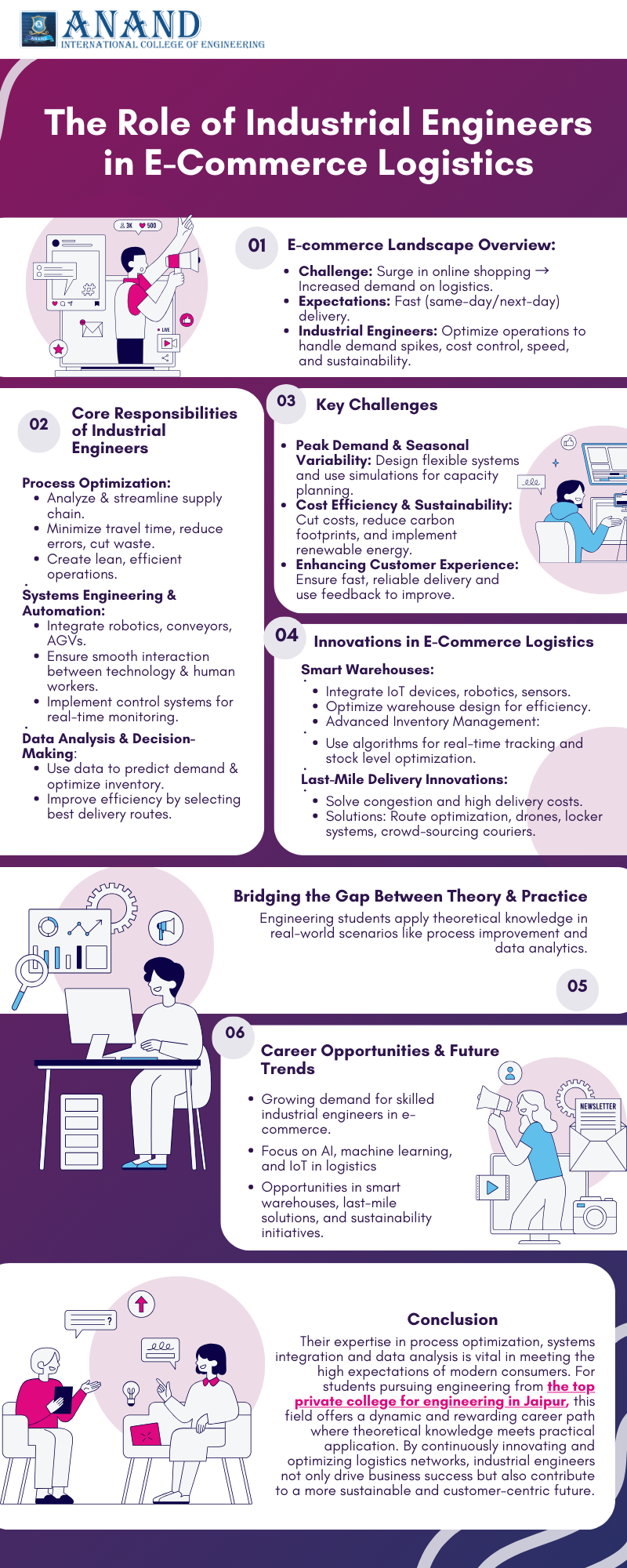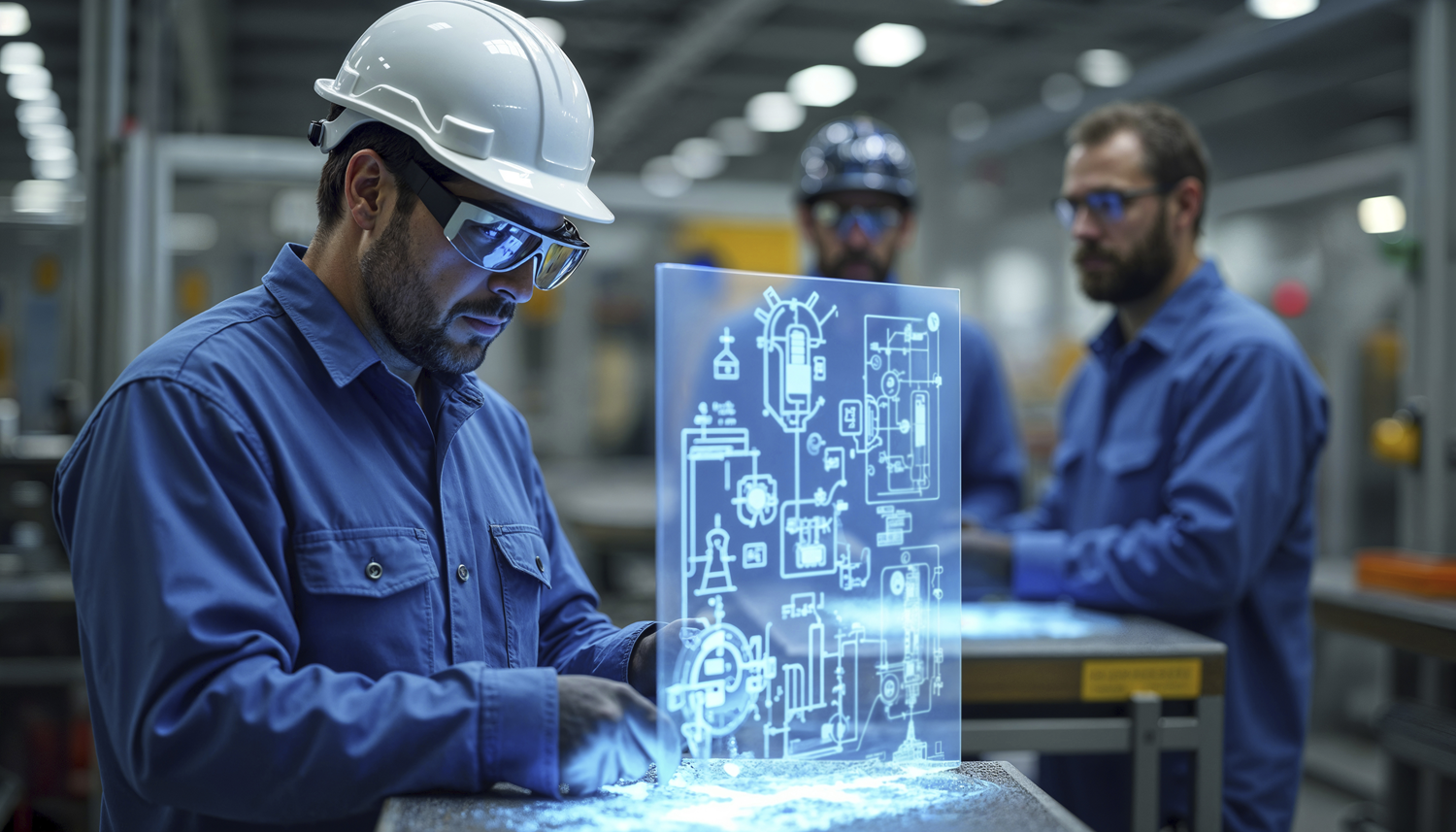Behind the scenes of every successful online order lies a complex network of processes and systems that ensure products move swiftly from warehouses to doorsteps. Industrial engineers are the unsung heroes who optimize these intricate systems which make e-commerce logistics both agile and efficient. In this article we’ll explore the multifaceted role of industrial engineers in e-commerce logistics, understand the challenges they face and see how their expertise is crucial in driving innovation in supply chain management.
Understanding the E-commerce Landscape
The surge in e-commerce has led to unprecedented demands on logistics networks. As consumers increasingly expect next-day or even same-day delivery then companies must continuously refine their operations to keep pace. This environment creates challenges such as fluctuating demand, the need for speed, cost control and sustainability considerations. Industrial engineers bring a blend of technical knowledge and process optimization skills that directly address these challenges.
The Core Responsibilities of Industrial Engineers
Process Optimization
One of the key strengths of industrial engineers is their ability to analyze and optimize processes. In the context of e-commerce logistics this means breaking down every step of the supply chain from order placement to last-mile delivery and identifying bottlenecks. For example by mapping out the process flow within a distribution center, an industrial engineer can redesign the layout to minimize travel time, streamline picking operations and reduce errors. Their goal is to create a lean operation that cuts waste and improves overall efficiency.
Systems Engineering and Automation
E-commerce logistics relies heavily on technology and automation. Industrial engineers play a pivotal role in integrating automated systems such as robotics, conveyor belts and automated guided vehicles (AGVs) into warehouses. By applying systems engineering principles, they ensure that these technologies work in harmony with human workers and legacy systems. This integration not only speeds up operations but also reduces the likelihood of errors. Industrial engineers also design control systems that monitor and adjust operations in real time which ensures that the entire logistics network remains responsive to changing conditions.
Data Analysis and Decision-Making
Industrial engineers are adept at turning vast amounts of information into actionable insights. They use statistical analysis and simulation tools to forecast demand, manage inventory and plan for capacity. By analyzing historical data and real-time trends industrial engineers can predict peak periods and design flexible systems that scale accordingly. This data-driven approach enables companies to make informed decisions, from determining optimal stocking levels to selecting the most efficient delivery routes.
Addressing Challenges in E-commerce Logistics
Managing Peak Demand and Seasonal Variability
One of the perennial challenges in e-commerce logistics is dealing with seasonal spikes and unexpected surges in demand. Industrial engineers design systems with built-in flexibility. They might employ techniques such as simulation modeling to test different scenarios, or develop contingency plans that allow operations to quickly scale up or down. Their work ensures that the system can handle high volumes without compromising on speed or accuracy.
Cost Efficiency and Sustainability
Cost efficiency is crucial in e-commerce, where margins can be slim and competition is fierce. Industrial engineers focus on reducing operational costs by eliminating inefficiencies and optimizing resource allocation. This might involve redesigning packing processes to use less material, or implementing energy-efficient systems in warehouses. Additionally, sustainability is becoming increasingly important to consumers. Industrial engineers are now tasked with designing green logistics solutions—reducing carbon footprints, optimizing routes to decrease fuel consumption, and integrating renewable energy sources into logistics operations.
Enhancing Customer Experience
At its core, e-commerce is customer-driven. Fast, reliable delivery is a major component of customer satisfaction. Industrial engineers contribute by ensuring that logistics operations are not only efficient but also resilient. Their designs include redundant systems and fail-safes that minimize delays. Moreover, they continuously monitor performance metrics and use feedback loops to improve service quality. When an order is delayed or a system hiccup occurs, it’s often the insights provided by industrial engineers that lead to rapid problem resolution.
Innovations Driven by Industrial Engineers
The Rise of Smart Warehouses
Smart warehouses represent the convergence of technology and industrial engineering. These warehouses leverage sensors, Internet of Things (IoT) devices and advanced robotics to create environments that are both highly efficient and adaptive. Industrial engineers are at the forefront of designing these systems. They determine the optimal layout, integrate automation seamlessly and ensure that data flows smoothly between various components. The result is a warehouse that can operate with minimal human intervention while maintaining high levels of accuracy and efficiency.
Advanced Inventory Management
Inventory management is a critical aspect of e-commerce logistics. Industrial engineers employ advanced algorithms and real-time tracking systems to ensure that inventory levels are optimized. This not only reduces holding costs but also minimizes the risk of stockouts or overstock situations.
Last-Mile Delivery Innovations
Last-mile delivery remains one of the most challenging components of e-commerce logistics. Urban congestion, delivery delays and the high cost of small-batch shipping are issues that industrial engineers work tirelessly to solve. Through route optimization algorithms and the integration of alternative delivery methods like locker systems, drone deliveries and crowd-sourced couriers industrial engineers help design last-mile strategies that are both efficient and scalable. Their work ensures that the final leg of the delivery journey is as streamlined as the preceding steps.
Bridging the Gap Between Theory and Practice
For engineering students from the best private engineering college in Jaipur, the role of industrial engineers in e-commerce logistics is a perfect illustration of how theoretical concepts are applied in real-world scenarios. The principles of operations research, systems engineering and process improvement learned in classrooms come to life in the bustling environment of e-commerce logistics. Students can see firsthand how optimization techniques, simulation models and data analytics are used to tackle complex challenges. Engaging in internships, capstone projects or research opportunities in this field can provide invaluable insights and practical experience.
Future Trends and Career Opportunities
As e-commerce continues to evolve the demand for skilled industrial engineers is set to grow. The future of logistics is likely to be shaped by advancements in artificial intelligence, machine learning and IoT. Industrial engineers will be required to design increasingly sophisticated systems that can learn from data and adapt to dynamic market conditions. This intersection of technology and logistics opens up exciting career opportunities for engineering graduates. Whether it’s developing smart warehouses, enhancing last-mile delivery systems or pioneering sustainable logistics solutions, the role of industrial engineers will be more critical than ever.
Conclusion
Industrial engineers play a pivotal role in the e-commerce ecosystem by ensuring that logistics operations are efficient, resilient and adaptable. Their expertise in process optimization, systems integration and data analysis is vital in meeting the high expectations of modern consumers. For students pursuing engineering from the top private college for engineering in Jaipur, this field offers a dynamic and rewarding career path where theoretical knowledge meets practical application. By continuously innovating and optimizing logistics networks, industrial engineers not only drive business success but also contribute to a more sustainable and customer-centric future.
In the ever-competitive world of e-commerce the blend of technology and process engineering is what sets leading companies apart. For those passionate about engineering and looking to make a tangible impact, exploring a career in e-commerce logistics might just be the perfect opportunity to bridge the gap between classroom learning and real-world innovation.


